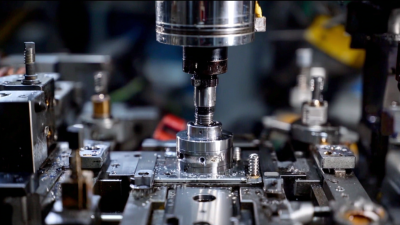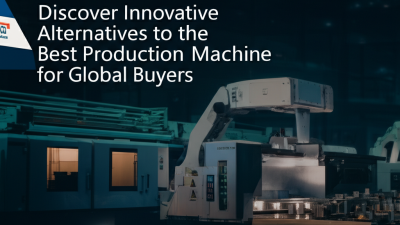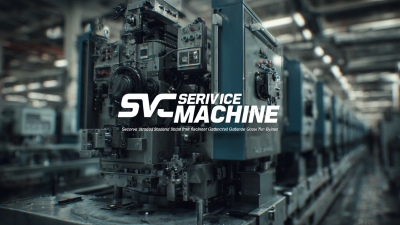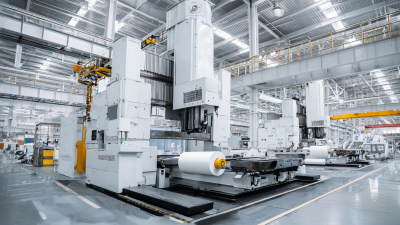Unlocking Efficiency with Parts Machine Innovations
In today's fast-paced manufacturing landscape, the quest for efficiency and innovation is more crucial than ever. "Unlocking Efficiency with Parts Machine Innovations" delves into the transformative power of advanced Parts Machine technologies, which are reshaping the way industries operate and produce. As we explore the future of these machines, we will uncover how cutting-edge developments are not only enhancing production speed but also improving precision and reducing waste.

The integration of smart automation, AI-driven analytics, and adaptive manufacturing techniques within Parts Machines heralds a new era that promises to streamline operations and optimize resource management. This blog will provide insights into these groundbreaking advancements and their implications for the manufacturing sector, paving the way for a more efficient, sustainable future.
Revolutionizing Manufacturing: The Role of Smart Parts Machinery in Efficiency
The manufacturing industry is undergoing a profound transformation with the integration of smart parts machinery, leading to unprecedented gains in efficiency. According to a report by McKinsey, companies that adopt advanced manufacturing technologies can improve productivity by up to 20-30%. These innovations, which include automation, robotics, and IoT-enabled devices, are not just streamlining production lines but also enhancing the precision of operations, reducing cycle times, and minimizing waste.

A survey by PwC indicates that 59% of manufacturers believe that smart machinery is crucial for increasing operational efficiency. The utilization of machine learning algorithms allows these smart machines to analyze performance data in real time, leading to proactive maintenance and reduced downtime. Furthermore, the introduction of additive manufacturing techniques has enabled quicker prototyping and lower material costs, further solidifying the role of these innovations in driving efficiency within the industry. With such impactful advancements, the future of manufacturing looks poised for remarkable improvements in productivity and sustainability.
Integrating Digital Solutions: Enhancing Performance with Machine Innovations
In today's fast-paced manufacturing landscape, integrating digital solutions is essential for enhancing performance through machine innovations. According to a recent report by McKinsey, companies that embrace digital technologies in their manufacturing processes see an average productivity increase of 25%. This shift not only streamlines operations but also minimizes waste, allowing for a more sustainable approach to production. By employing advanced data analytics, manufacturers can optimize machine performance and predict maintenance needs, thereby reducing downtime and increasing overall efficiency.
Moreover, the adoption of Industry 4.0 principles, which leverage the Internet of Things (IoT) and artificial intelligence, is transforming the way companies operate. A Deloitte study highlights that manufacturers implementing smart technologies can expect a revenue boost of up to 30% over five years. These innovations enable real-time monitoring and data collection, facilitating informed decision-making and continuous improvement in production processes. As organizations increasingly recognize the value of integrating digital solutions, those who fail to adapt may find themselves at a competitive disadvantage in an ever-evolving market.
Cost Reduction Strategies: How Advanced Parts Machines Save Time and Money
In today's fast-paced manufacturing landscape, the adoption of advanced parts machines is revolutionizing cost reduction strategies. These innovations streamline production processes by automating complex tasks, which minimizes labor costs and reduces human error. For instance, cutting-edge CNC machines can produce intricate parts with greater precision and speed than traditional methods. As a result, businesses can significantly lower their operational expenses while increasing output levels.
Moreover, these machines often come equipped with smart technology that enables real-time monitoring and predictive maintenance. By proactively addressing potential issues before they escalate, companies can avoid costly downtimes and maintain smoother production cycles. The integration of data analytics further enhances efficiency by optimizing workflows and resource allocation. Ultimately, the use of advanced parts machines not only drives cost savings but also fosters a competitive edge in the market, positioning companies for long-term success.
Customization on Demand: Tailoring Machine Functions to Specific Needs
In today's competitive manufacturing landscape, the demand for customized solutions continues to rise. According to a recent report by McKinsey, nearly 70% of manufacturers are increasingly focusing on customization to meet their clients' unique requirements. The shift towards customization not only enhances product quality but also drives operational efficiency. By tailoring machine functions to specific needs, companies can significantly reduce waste, improve productivity, and enhance overall profitability.
Implementing customized machine functions can initially seem daunting. However, manufacturers can adopt a few tips to ease this transition. First, investing in flexible machinery that can be easily adapted to various tasks can pay off in the long run. These machines often feature programmable interfaces that allow for rapid changes, catering to a range of products without extensive reconfiguration. Second, leveraging data analytics can provide insights into production patterns, enabling companies to predict customization needs effectively. This proactive approach facilitates a smoother workflow and better resource allocation.
As customization becomes increasingly critical, embracing innovative machine parts technology is essential. According to market research by PWC, firms that adopt on-demand customization strategies are 44% more likely to outperform their competitors. By focusing on tailored machine functions, manufacturers can not only meet customer expectations but also bolster their market position in an evolving industry.

Future Trends in Parts Machinery: What to Expect in the Next Decade
The next decade is poised to witness remarkable advancements in parts machinery, driven by innovations that enhance efficiency and production capabilities. According to a recent report by Markets and Markets, the global CNC machine market is expected to grow from $63 billion in 2021 to over $100 billion by 2026, reflecting a compound annual growth rate (CAGR) of 10.5%. This surge is largely attributed to the increasing adoption of automation and smart manufacturing technologies.
Emerging trends such as additive manufacturing, often referred to as 3D printing, are set to revolutionize the parts production landscape. A report by Wohlers Associates indicates that the 3D printing industry will reach $35.6 billion by 2024. This shift not only reduces waste but also allows for the creation of complex geometries that traditional machining methods cannot achieve. Additionally, the integration of IoT and AI in machinery will enable predictive maintenance, enhancing machine uptime and reducing operational costs. As manufacturers embrace these technologies, the efficiency of operations will undoubtedly unlock new opportunities for growth and innovation in the parts manufacturing sector.
| Trend | Impact on Efficiency | Predicted Adoption Rate (%) | Expected Innovations | Year of Predicted Peak |
|---|---|---|---|---|
| Automation in Parts Manufacturing | Increased production speed and accuracy | 75% | Robotics, AI systems | 2025 |
| Predictive Maintenance | Reduces downtime and maintenance costs | 68% | Machine Learning, IoT sensors | 2026 |
| 3D Printing for Parts | Customizable components and reduced waste | 60% | Material innovation, advanced printers | 2027 |
| Sustainability Trends | Lower environmental impact and energy use | 80% | Eco-friendly materials, energy-efficient designs | 2028 |
| AI-Driven Design | Enhanced design processes and product optimization | 70% | Generative design software | 2030 |
Related Posts
-

Top Strategies for Sourcing the Best Welding Machines in the Global Market
-

Transforming Industries with Best Plastic Material Machine Practical Applications and How to Implement Them
-

Craftsmanship in Action Elevating Global Standards with the Best Machine Repairing Machine
-

Discover Innovative Alternatives to the Best Production Machine for Global Buyers
-

Elevating Industry Standards with the Best Service Machine for Global Buyers
-

Unleashing Excellence in Manufacturing with the Best Production Machine from China for Global Markets
